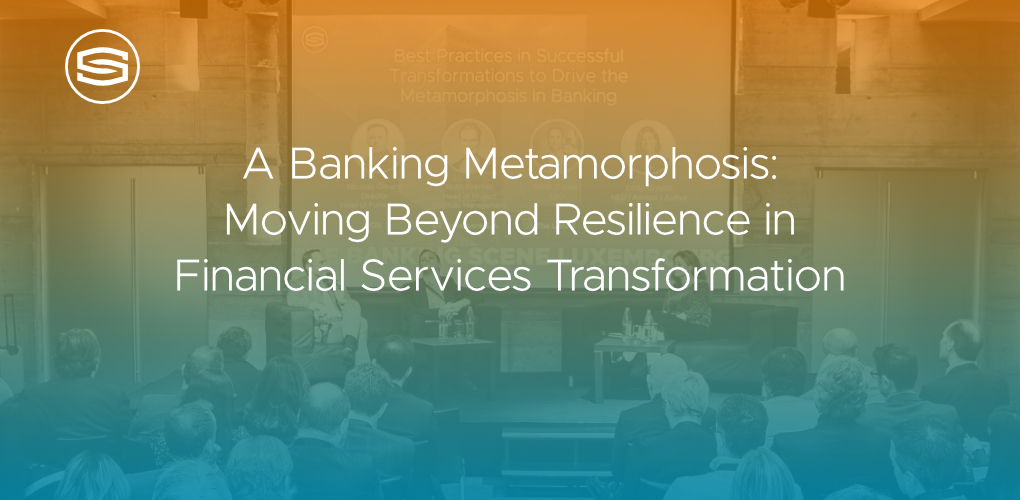
Insights & Opinions
A Banking Metamorphosis: Moving Beyond Resilience in Financial Services Transformation
Mon, 03 Feb 2025


Traditionally, our first meetup of the year happens in the utter south of our Benelux market. And so, on January 28, 2025, The Banking Scene Conference 2025 Luxembourg brought together industry leaders to explore the profound transformations shaping financial services. Leda Glyptis, a good community friend and renowned fintech expert, delivered a compelling keynote based on her latest book, Beyond Resilience: Patterns of Success in Fintech and Digital Transformation, which investigates whether success in banking transformation follows repeatable patterns.
"Is success pattern-based? Is the journey of successfully building new banks or services (either from scratch or in the context of a going concern) predictable enough to be repeatable? And if there are patterns, are they within our gift to replicate?" was the research topic for the book, and we had the honour of distributing the book among our participants one day before the official release.
Following her keynote, she was joined by Nasir Zubairi (CEO of the Luxembourg House of Financial Technology, LHoFT) and Nicolas Gerard (Head of Fund Administration at Citi) for a panel discussion that expanded on her insights, with a third industry leader that unfortunately fell ill the days before the event.
The key message was clear, and for the fans of #LedaWrites and #mytribe, it was not a surprise: transformation is hard. Most efforts fail. But success is possible—if financial institutions move beyond resilience and embrace the right leadership, strategy, and cultural mindset.
The Reality of Transformation: Why Most Fail, and What a Submarine Can Teach Us
Glyptis’s research highlights sobering statistics:
- Between 90 and 98 percent of startups fail.
- Seventy percent of corporate transformation programs don’t achieve their goals.
The question is: why is that, and how can we, as an industry improve?
The financial industry has been digitising for decades—often with mixed results. As Leda emphasised, failure is rarely due to technology, and we repeat it over and over again at our conferences too. Instead, human factors—resistance to change, poor leadership, and misguided strategies—stand in the way.
Transformation is messy and met with resistance because people are attached to the status quo; anything less than perfection feels risky, and employees struggle to see their role in the future. Empathy and clarity are the antidotes to resistance. Successful transformation is not about forcing change but about bringing people along the journey.
"Sometimes, you must accept that your project may be deprioritised, even if it’s the right course of action. It’s about timing and knowing when to operate like a submarine—remaining beneath the surface until the right moment to resurface," said Nicolas Gerard, reflecting on internal corporate obstacles to innovation.
Redefining Leadership: The Death of the Heroic Leader
One of the biggest myths in digital transformation is the idea of the "heroic leader"—the lone visionary standing against all odds, wielding change like a sword. In “Beyond Resilience”, Leda explicitly rejects this narrative, arguing that successful leadership is not about individual heroics.
She writes: "This book is not a hagiographic founder story that elevates the founder’s own narrative to a montage of challenge and resilience, grit, perseverance and a soaring successful crowning at the end: a narrative that, figuratively speaking, can play out while ‘Eye of the Tiger’ is blaring in the background."
Instead, the common trait of successful transformation leaders is adaptability. Successful leaders listen and learn, take feedback seriously from customers, employees, and market signals, understand trade-offs, and empower teams.
"Leadership is not about following a straight path. There are no straight lines in business. Everything is squiggly," remarked Nasir Zubairi, illustrating how leadership requires navigating organisational complexity.
Fix Forward: Progress Over Perfection
A major theme of Glyptis’s talk was the need to embrace imperfection. Transformation does not require perfection—it requires progress. Organisations often hesitate to move forward because they fear getting it wrong. However, successful companies recognise that failure is inevitable.
What matters is how quickly they learn, adapt, and move forward. Revolut exemplifies this. Initially, its business model focused on peer-to-peer foreign exchange. It struggled. However, rather than giving up, Revolut pivoted and refined its offering. Today, it stands as one of the most successful neobanks, with a valuation exceeding £40 billion.
Failure is not the enemy.
Stagnation is.
Leaders must encourage teams to fail fast, learn, and fix forward.
"Luck plays a part, but those who’ve done it before know how to manufacture serendipity," said Gerard, highlighting how experience helps leaders position transformation efforts for success.
Regulators: Problem or Solution?
The panellists touched on the complex role of regulators in transformation. Regulators create problems, introducing new compliance requirements and governance burdens. But they also create certainty, which can open new opportunities. "Regulators create problems to solve. But they also create certainty, and that is essential for innovation," Nicolas Gerard noted.
For example, the Markets in Crypto-Assets Regulation (MiCA) is positioning the EU as a leader in digital assets, creating a structured, legitimate framework for innovation.
Yet, regulatory complexity remains a major hurdle. The experts noted that compliance teams now drive decision-making in banks rather than business leaders, and that kills business opportunities.
"Banking is now run by compliance officers. It used to be the business calling the shots. That’s changed, and navigating that shift is critical," observed Nasir Zubairi.
Final Thought: The Future of Banking Transformation
The banking industry is at a critical pivot point. Margins are shrinking, regulation is increasing, and competition growing. The panellists agreed on several key takeaways. The following five to ten years will be different from the last. Banks must rethink their culture to attract top talent. The old ways of working—slow, bureaucratic, and risk-averse—will not be sustainable.
"Financial institutions need a cultural transformation to attract top talent. The best minds aren’t choosing banking anymore; they are going to tech firms and fintech startups. If banks want to compete, they need to change their approach," said Nasir.
Transformation is hard. Leadership is harder. But if done right, financial institutions can move beyond resilience—to thrive, not just survive.
These conversations, as well as Leda’s new book, underscored the reality that the future of banking is not just about technology. It is about people, leadership, and the ability to navigate complexity. The next wave of transformation will belong to those who can balance adaptability, risk, and culture while maintaining momentum in an ever-changing landscape.
The question is: Will today’s banking leaders rise to the challenge?
P.S.: we have a decent amount of copies left for our Library at The Banking Scene Conference 2025 Brussels, free to take home!


